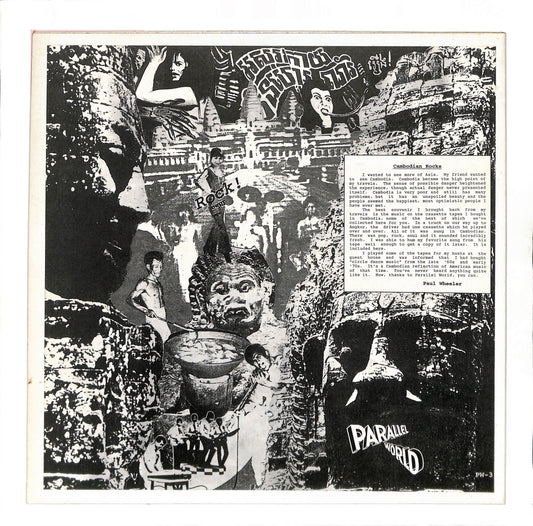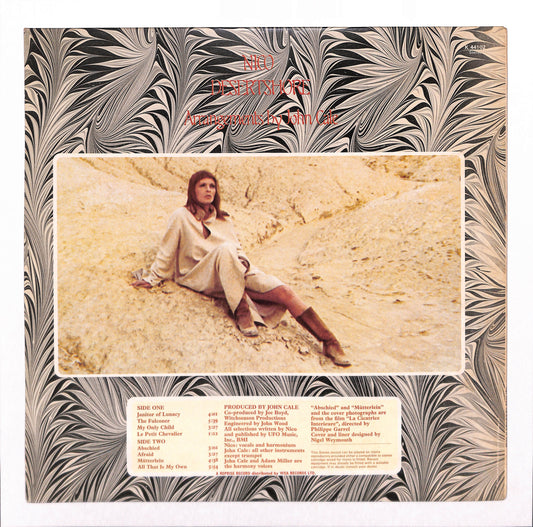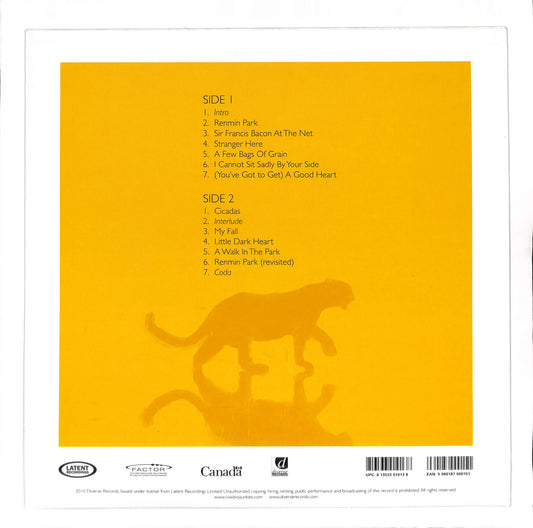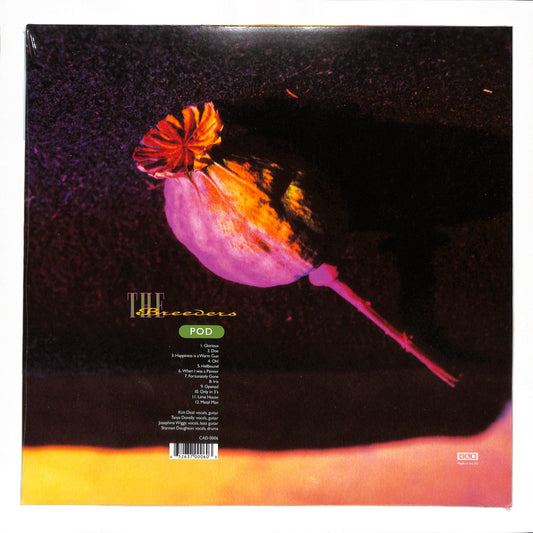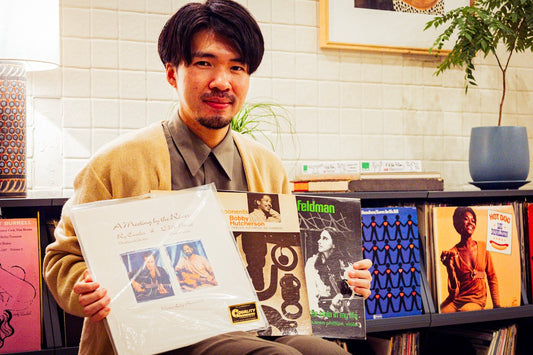"WHAT'S IN YOUR CART?" is an interview series where we invite record-loving guests to select their current top 5 picks from the ELLA ONLINE STORE lineup. For the special first edition, we are excited to present a luxurious triple feature with three distinguished guests.
The first guest is Keiichi Sokabe, known for his work with Sunny Day Service and as a solo artist, as well as for running his independent label, ROSE RECORDS. We invited him to our newly opened vintage record showroom, "ELLA RECORDS VINTAGE," located in Shimokitazawa, a place closely associated with him. While selecting his favorite records, Sokabe shared his deep passion for vinyl. Enjoy discovering Sokabe's profound knowledge and the messages behind his choices, showcasing a side of him as a dedicated record enthusiast that is rarely seen.
Interview & text: Mikiya Tanaka (ELLA RECORDS)
Photo: KenKen Ogura (ELLA RECORDS)
Furniture design & production, Interior coordination: "In a Station"
Furniture cooperation: "BULLPEN"
Special thanks to: Satoshi Atsuta
Keiichi Sokabe's Top 5 Picks
①Felt/Poem of the River(1987)UK original
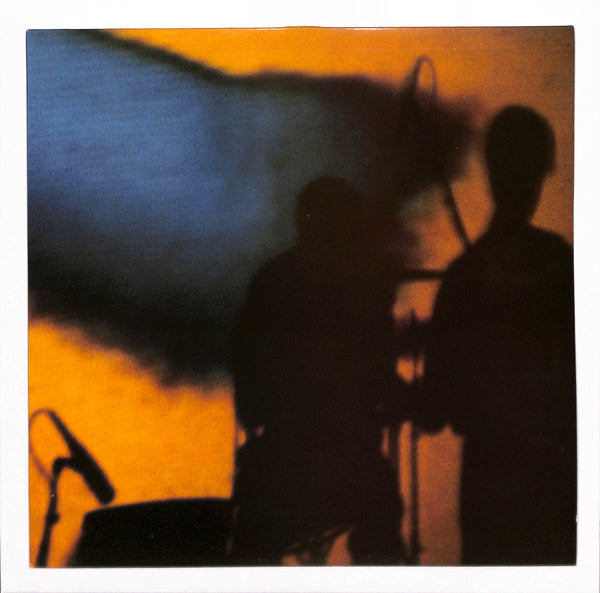
I really love the band Felt, but I don't own this one. When they moved from Cherry Red to Creation Records, I felt a bit distant from their new direction at the time. Felt, which used to have a darker tone, suddenly felt very pop and catchy to me. But now, listening to it, I think it's really great. After Felt disbanded, Lawrence formed another band called Denim, which is also pretty good, but I sold those records. People of our generation often transitioned from neo-acoustic to rare groove in the 90s. When that happened, there was a period where neo-acoustic felt a bit embarrassing, so many people, including myself, ended up selling their neo-acoustic records. Now I'm buying them back.
②V.A./Cambodian Rocks(1996)US original
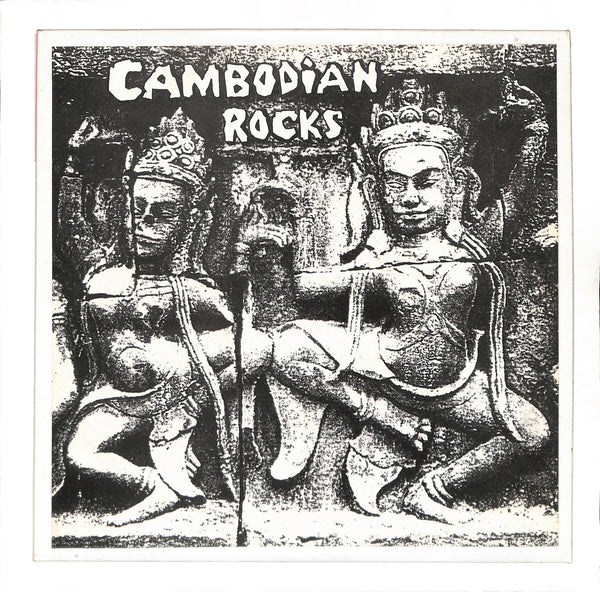
I wasn't aware of this compilation. There were Cambodian rock compilations released in the 2000s, but this one came out much earlier, right? In Cambodia, there was a rock and garage scene in the 60s, but most of it was destroyed and didn't survive. The culture was suppressed, which caused it to almost disappear. That's why I'm interested and want to listen to it. By the way, one of the members of Sun City Girls runs a label called Sublime Frequencies, which focuses on music from remote regions. He said that he personally meets the musicians and rights holders. He even goes deep into places like Indonesia to say, "Please license this record to me." It's incredible.
③Nico/Desert Shore(1970)UK reissue

Sokabe
I used to own this album but ended up selling it, and now I'm looking for the original again. This type of music didn't really resonate with me back in the day. I thought it was kind of dull and dark, so I sold it. But then I heard Mori from EGO-WRAPPIN' play it during a DJ set, and I thought it was amazing. Later, I heard the Kyoto-based band Homecomings play it as the opening for their live show, and I was impressed again. So, I bought the reissue. But now, I want the original. This is a UK pressing, and I do like the UK sound. Even though it's a reissue, the jacket has a nice textured finish.
④Cowboy Junkies/Renmin Park - The Nomad Series, Volume 1(2010)UK
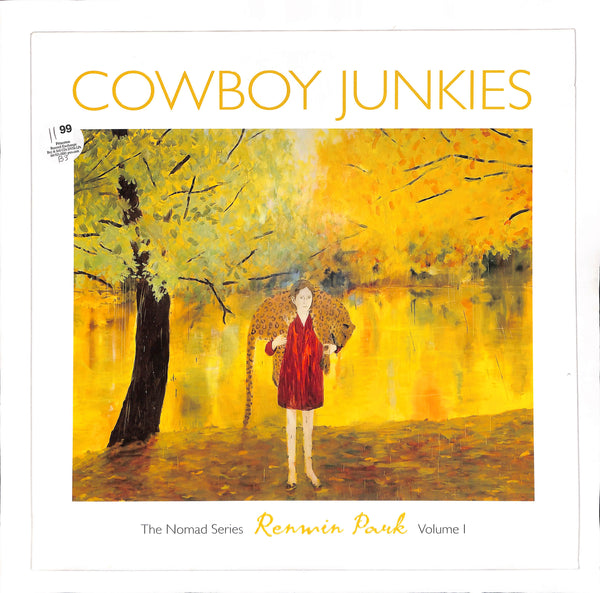
Sokabe
I like Cowboy Junkies, but I hadn't listened to this album before. Seeing the actual record, I really appreciate the embossed jacket. I went to see their 2017 live performance at Billboard Live, and it was fantastic. I had only listened to their early works, but they are still actively performing with the same vibe and mostly the same members. It's impressive how such a long-lasting band can maintain their quality over the years. Touring and probably making a living from it shows the richness of the cultural foundation in America. It's not just for acoustic music but also for metal and punk. There's always an audience wherever they go, and the money flows... It's something I really admire. I hope Japan can become like that someday.
⑤The Breeders/Pod(1990年)EU reissue
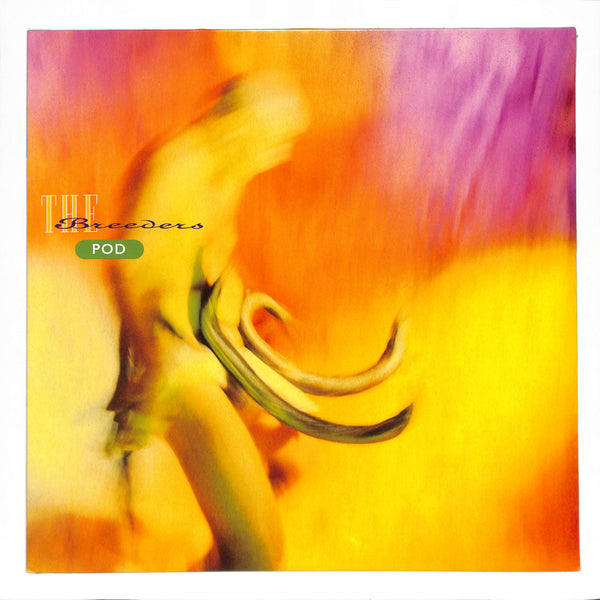
I bought the original of this album when it first came out, at a record store in Okayama. At the time, I didn't know anything about The Breeders, but I thought the music must be good because the jacket looked beautiful. This reissue has slightly faded colors on the cover, but the original had much richer colors. Choosing this record also has a tribute element to the producer, Steve Albini. When I first listened to it, I thought the sound was really strange. I liked punk and hip-hop, but this sound didn't belong to either genre. My first impression was that "the sound is weird," even before the songs themselves. However, the more I listened, the more I appreciated it. Regarding Albini, it's his cool independent spirit that stands out. When he came to Japan, after finishing a live show, he stayed on stage and said, "I'm going to sell T-shirts now," and handled the merch himself. He's consistently done things like that, which I see as the essence of adult punk.
Interview: Keiichi Sokabe and Records

━━Can you tell us about how you first got into records?
Sokabe:I think I started consciously buying records around the time YMO's "Kimi ni, Mune Kyun." came out. So, that would be around 1983 when I was in the sixth grade. I loved the song and asked my parents to buy it for me. Just the other day, when I was introducing this song on the radio, I brought my own single from back then.
I started listening to Western music when I was 11, with bands like The Rolling Stones and The Beatles. I really got into music when I started buying LPs in my first year of junior high school. The first one I bought was a compilation called "No Stone Unturned" by The Rolling Stones, which was an American release. The Japanese edition had a limited red vinyl for the first press and it was 2,000 yen. At that time, all of the Stones' Japanese releases were reissued as colored vinyls. I wanted to collect them all back then, and even now, I still occasionally add to my collection.
Since then, I've been continuously buying records. At the same time, I've sold quite a few as well. It's been a cycle of selling and buying back, selling and buying back... It's a bit of a hassle, but that's my life . lol
━━How often do you visit record shops nowadays?
Sokabe:If I'm not on tour or recording and I'm at home, I go every day. I usually visit the shops in Shimokitazawa, but if I have work in Shibuya, I go to the shops there. I also visit local shops when I'm on tour. For example, I go to Disk Union in Nagoya even if I don't have work there. I stop by on my way back to Tokyo from Osaka.

━━How many records do you currently own?
Sokabe:I wonder how many I have... I'm not really sure. (Pointing to the record rack at the interview location) How many are in here? About 4,000 records? I probably have at least this many. But not all of them are on shelves; some are stacked under my desk as well lol. So, it's hard to say for sure.
━━How do you manage such a vast record collection?
Sokabe:Last year, I finally organized them by genre. Before that, it was a mess, and I just had a general idea of where things might be.
There was a time when Yuu Taniguchi, our keyboardist, was recording at my place, and we started talking about the mono pressings of The Byrds. He's also a fan of records. We were discussing how there are some Byrds albums that only have mono versions in the UK (Editor's note: “Sweetheart of the Rodeo”, 1968, “Dr. Byrds & Mr. Hyde”, 1969). He said he didn't have them, so I tried to find mine for him, but even after an hour of searching, I couldn't locate them... The atmosphere cooled down, and it ended with, "Maybe next time," which was kind of sad. lol
But organizing from that kind of mess is really tough. So, I gave up on alphabetizing them and started with rough genre categories like rock and soul. Then I gradually broke it down further, like separating psychedelic and metal within rock. Now, it's at the point where I can find what I'm looking for. That's why I think people who organize everything alphabetically are amazing.
Also, people are really particular about the condition of the jackets these days. Back in our time, we didn't care about that at all. For example, there's a famous second-hand record store in London called Exchange. They used to display just the record jackets on the shelves to prevent theft, and when you brought one to the counter, the staff would fetch the vinyl from the back. The jacket was treated merely as a cover for the record.
But now, people talk about things like "corner bends," which gets on my nerves. So, I've started putting all my records in plastic sleeves, partly as a part of my end-of-life preparations. lol I figure my kids will probably sell them all when I die, so I'm trying to prevent them from getting lower appraisals due to corner bends or other issues. lol I've also removed any marking stickers. For high-value records, I put the jacket in a sleeve with tape and store the vinyl separately outside the jacket.
I really think records are a valuable asset now. In the past, art was the primary investment target, but now even musical instruments are seen that way, with Les Paul guitars fetching millions of yen. Some people are buying them as investments. I think records will soon be viewed the same way.

━━Do you have a particular preference for original pressings?
Sokabe:I'm very particular about it. I want the original pressings of things I like. However, it also depends on which country's original pressing it is. For example, with The Beatles, the UK pressing is the original from their home country, but when it comes to their early works, I prefer the original Japanese pressings, like the red vinyl ones from Toshiba. There’s something about the Japanese originals that captures the excitement of The Beatles arriving in Japan. On the other hand, listening to the UK originals makes you feel the intensity of The Beatles breaking out onto the world stage and the vibe of Liverpool. For me, the excitement of "The Beatles have come to Japan" that I feel from the red vinyl pressings is more emotional.
So, rather than just focusing on which country's original pressing it is, I think what's really important is "my original." For example, when it comes to The Stone Roses' original, for me, it's not the vinyl but the first Japanese CD release. It includes these incredibly passionate liner notes written by Masui from Rockin' On. That world is what I consider original. So, I don't necessarily believe that only the original from the home country is the true original.
There’s a purist belief in first pressings from the home country, but what’s the basis for that? Music is about "emotion," right? It’s a matter of the heart. It's about what satisfies your heart. For example, someone might say, "For me, Nirvana is this used CD I bought. It's all scratched up, see?" or "I dropped it once, so it's cracked here." That's the true original for that person. So, it doesn't even matter if it's a record or a CD. It could be that a cassette tape a friend made for them is their original Sex Pistols. I understand people who insist, "This is the only original Beatles," but I think it's great that everyone has their own original. I want people to cherish finding "their original."

━━Do you often buy reissues as well?
Sokabe:Yes, I do. Many new pressings have improved sound quality. For example, The Specials' first album, "The Specials." The new cutting from a few years ago sounds much better. It has the true sound of the original tapes. So, I think I need to check all the reissues. When something is reissued with a new cutting from the original master, I usually buy it. If I find that the original pressing is still fine, I might let the reissue go. But when I come across something like The Specials that has significantly improved, it's really exciting.
Another example is Ian Dury's first album, "New Boots and Panties!!". The reissue had excellent cutting. In the UK, the quality of the original cutting varied at that time. Plus, for indie labels or punk labels like Stiff Records, which released this album, they probably didn't have a lot of money to invest, so it's possible that the original cutting wasn't great. There are many factors to consider.
So, every time a reissue comes out, I feel like I have to check it, which is a bit of a joyful burden, lol. However, when it comes to the jackets, I don't think it's possible to perfectly recreate the original, including the texture, because the original materials are no longer available. If you want that authenticity, you have to buy the originals from back then.
We're already kind of freaks, aren't we, lol. Once you become an obsessive collector like us, there's no turning back. But I hope young people don't worry about these things at all and just enjoy good music at an affordable price. It feels odd for young people to start off by trying to get rare or original pressings. I think it's more important for them to listen to a wide variety of music first, and that's why reissues exist.

━━Are there any specific genres you are particularly looking for or into right now?
Sokabe:There's not a specific genre I'm focused on, but I'm really into collecting the colored vinyl editions of The Rolling Stones' albums. The Japanese reissues from back then came in various colors like red, blue, and orange. I already have the albums, but I'd like to complete my collection with all the different colors.
Also, the first pressings of Miyuki Nakajima's singles are on colored vinyl. I want to collect all of those too. Sometimes people put up whole collections on auction, but buying them all at once just feels like it takes the fun out of it, lol.
So, it's not really about a specific genre for me. It's more of a childish desire to complete a series, like "I want to have the entire collection."
I've also been listening to reggae for a long time, and I'm really interested in the silk-screened dub jackets from back then, but I can't bring myself to buy them. I'd rather spend that 100,000 yen to buy a lot more reggae records instead of just one.
But sometimes you can get original pressings for cheap. For example, I have an early Jamaican original pressing of The Wailers with a worn-out jacket. The sound quality of those Jamaican pressings from back then isn't necessarily great, but there's an indescribable magic to them. It's like, "Wow, they made this back then." It's that romance or something. Maybe it's just my imagination, lol. I picture Peter Tosh holding the record saying, "Hey, we did it!" and Lee Perry handing it over saying, "Here it is!" with Bob Marley reacting, "Really?" lol. Thinking about stuff like that while listening is part of the charm. The allure of those original Jamaican reggae pressings is something I can't quite escape.
By the way, in the past, there was no way to identify Jamaican pressings. There were no matrix numbers (Editor's note: identification numbers inscribed in the runout area of the record for manufacturing management), so you couldn't tell which ones were original pressings. Now, research has progressed, and we have a better idea. Back then, I asked a reggae buyer how they identified them, and they said, "You lick it," lol. I was like, "It's about the taste?!" lol.

━━What's at the top of your record want list?
Sokabe:There are a few. First, there's "Index," the first single by Felt, which I mentioned earlier. I have almost all of Felt's releases from the Cherry Red period, but this one was self-released before that, and I've always wanted it. It's quite rare and features just guitar noise without any vocals.
Another one is "40oz. Casualty E.P.," the first single by The Casualties, a punk band from New York.
There are also a few original psychedelic records I'm looking for, which sometimes show up at Disk Union for around 70,000 to 80,000 yen. But I don't like the idea of buying them just because I saw a blog post saying they'll be available at some out-of-print sale on a specific date. I want there to be some romance or genuine love in the encounter, lol. So, I'm waiting for the right moment to find them.
━━Has the way you buy and listen to records changed since the advent of subscription services?
Sokabe:When I'm interested in a record now, I can listen to it on a subscription service or YouTube and decide whether I want to buy it or not. It's really convenient for checking out music. In the past, I often bought records without knowing what they sounded like.
There are also new bands I've come to love thanks to subscription services. However, most current American hip-hop artists, even the major ones, don't release their music on vinyl. They don't release CDs either. Since I can't memorize the songs when they're only available on subscription services, it can be quite frustrating. So, I always check to see if there are any physical releases for the artists I like. But I do think it's great that many artists can release their music online, which might not have been possible without subscription services.

━━What makes a "good record shop" for you?
Sokabe:A good record shop should carry all genres and have a wide range of prices, from affordable to expensive. It should also be a place where you can browse at your own pace. That's really all it takes. If the owner seems overly self-assertive or if you feel like you're being watched, it makes you tense. I've ended up buying expensive jazz records I didn't even want just because of that, lol. So, being able to browse at my own pace is all I need.
Also, I hate it when I ask about the price and they say, "This isn't for sale," lol. It happens sometimes. There are shops where the owner just has items on display and won't sell this or that. It's not a bar, so give me a break, lol.





